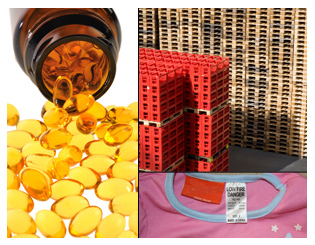Worlds largest retailer banning products with PDBEs
In a very bold move, Wal-Mart stepped ahead of US federal regulators and announced that it will soon no longer sell products containing a chemical that has been related to health and environmental issues.
Wal-Mart recently informed its suppliers that as of June 1, 2011, it will begin testing products to ensure that they do not contain the controversial flame retardant chemicals PBDEs. This chemical, which is found in hundreds of consumer goods (couches, electronics, mattresses) has been associated to liver, thyroid, reproductive and brain development issues in laboratory animals. This chemical has also been linked to pharmaceutical recalls as a result of these products having been transported on plastic shipping pallets treated with the toxin.
What are PBDEs?
Poly brominated diphenyl ethers (PBDEs) belong to a larger class of brominated substances that are used as flame retardants. Many variants of this chemical exist.
What are PBDEs used for?
These chemicals are the primary components of substances that are frequently used as flame retardants in consumer goods. The purpose of these chemicals is to slow ignition and fire growth, increasing escape time in the event of a fire.
What are the concerns related to PBDEs?
While flame retardants save lives, belongings and property, many inadvertent issues have resulted from exposure to these chemicals. Mounting evidence suggests that PBDEs remain in the environment and collect in living organisms. Studies have shown that these chemicals can result in liver, thyroid and neurological developmental toxicity.
States banning PDBEs
Lorenzo Lopez, a spokesman for Wal-Mart, stated that the retail giant had previously banned some products with PDBEs in the past, but that the company was motivated to act in a more public and widespread manner after some US states began banning PBDEs. (The State of Oregon passed a law that will prevent the transport of food on plastic pallets; other states that have banned the use of BPDEs include Washington, Maine, Maryland and Vermont.)
Flame retardant plastic pallets
Wal-Mart's PBDEs ban includes all consumer merchandise; this is certainly a positive step in reducing human and environmental exposure to these chemicals. However, the next action must include banning the delivery of food and pharmaceutical products on plastic shipping pallets that contain important amounts of these toxic substances.
For example, the largest plastic pallet rental company in the US, Intelligent Global Pooling System (iGPS), uses pallets treated with decabromodiphenyl ether (decaBDE), a form of PDBEs, to ship...food industry products.
Ban chemically treated plastic shipping pallets
The National Wooden Pallet and Container Association (NWPCA) respects Wal-Mart's proactive stance in banning consumer products containing BPDEs, but the NWCPA hopes that the increase in laws and regulations concerning BPDEs will prompt more suppliers and retailers to reconsider using plastic shipping pallets to transport consumer goods such as food and pharmaceutical products.
The heat treatment of wood pallets (a process where the wood shipping pallets and wooden crates are heated to a core temperature of at least 56 °C or 132.8 °F for a minimum of 30 minutes) not only destroys parasites, but heat treated pallets are safe to use in the food and pharmaceutical industries.
L.C.N. inc. was the first North American wood pallets manufacturer to offer heat treated pallets. We guarantee that our products meet the strictest cleanliness and sterilization standards as required in the food and pharmaceutical industries.
http://www.palletcentral.com
http://www.washingtonpost.com/politics/wal-mart-bypasses-federal-regulators-to-ban-controversial-flame-retardant/2011/02/18/AB3GB7I_story.html
http://www.epa.gov/opptintr/pbde/